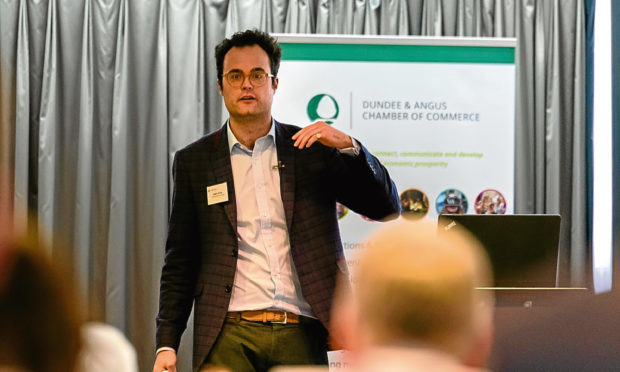The challenges and opportunities of the food and drink sector for Tayside businesses were highlighted at a business breakfast hosted by Dundee and Angus Chamber of Commerce yesterday.
Adam Hunter, the commercial manager of the Angus-based Arbikie Highland Estate Distillery described the company’s field to bottle operation which will soon be launching in America.
Based on a 2,000 acre farm, the distillery made use of “wonky veg” — potatoes the wrong shape for supermarkets — to make Scotland’s first potato vodka.
A panel discussion featured Kathryn Baker of Arbroath-based Sacred Grounds Coffee Company, Jamie Smith from James Hutton Limited and Duncan Alexander, the co-founder of Dundee beer firm 71 Brewing.
Chamber of Commerce chief executive Alison Henderson asked the panel for their thoughts on automation in light of a recent report which claimed 20,000 jobs could be made obsolete by 2030 in Dundee alone.
Mr Smith said the James Hutton Institute worked closely with the soft fruits industry in which the issue was topical at the moment.
He said: “Automation is coming whether we like it or not.
“People we work with who produce strawberries and raspberries are asking the question — how can we make this more automated?
“There are already early stage prototypes of robots that can pick fruit.”
However, Ms Baker said she believed her coffee firm would lose part of its appeal if it became too automated.
She said: “The minute we start to expand and become more technical in what we do, I think we will lose an awful lot of what sets us apart from other coffee roasteries.
“The bigger roasteries use a lot more technology but that’s something that we rebel against – we use human skill and I think that’s why we are developing the following we do.”
Mr Alexander said technology and automation was increasingly coming into the craft beer sector.
He said: “At the same time as this drive towards automation which on a massive scale will lead to job losses there is also a drive to doing things by hand that are artisan and craft — that’s almost in the opposite direction.
“In the craft beer industry it started with guys with pots and pan and people who are buying the beer now are more demanding and knowledgeable.
“There is more automation coming into the artisan or craft way of doing things.”
Mr Hunter said he believed people shouldn’t be scared of automation as it will also provide new opportunities.
